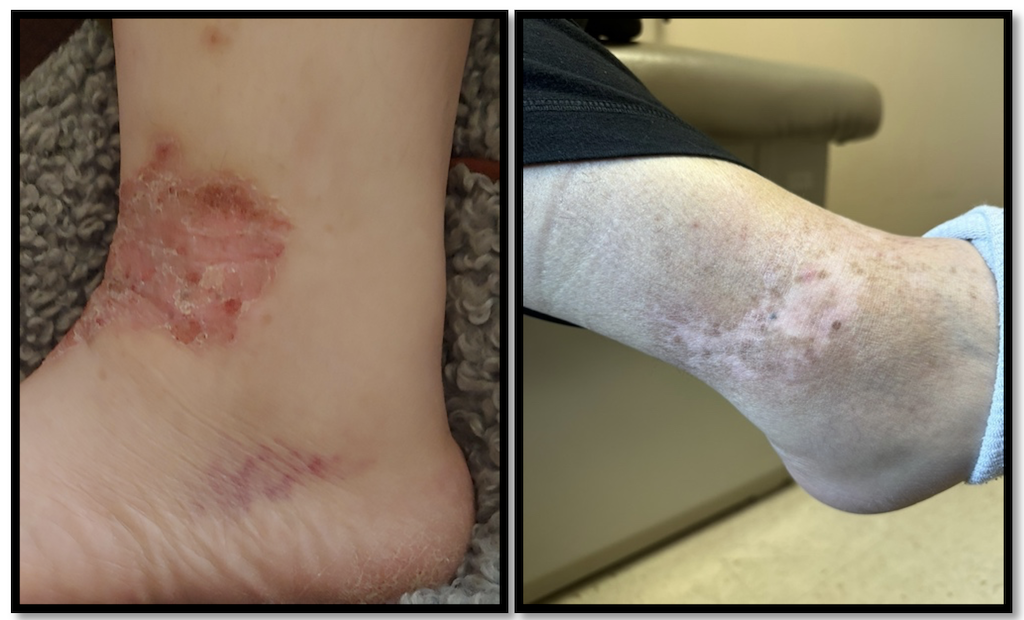Monday Poster Session
Category: Liver
P3887 - When Psoriasis Heals and the Liver Fails: A Unique Presentation of Kratom Toxicity
Monday, October 27, 2025
10:30 AM - 4:00 PM PDT
Location: Exhibit Hall
- SP
Sheel Patel, DO
University of Louisville
Louisville, KY
Presenting Author(s)
Sheel Patel, DO, Matthew Cave, MD
University of Louisville, Louisville, KY
Introduction: Kratom is a popular, unregulated herbal supplement used for its psychotropic and opioid-like effects. It has emerged as a significant cause of drug-induced liver injury, including rare cases of acute liver failure (ALF). Little is known about its immunomodulatory effects. We present a unique case of spontaneous remission of plaque psoriasis from acute liver failure due to Kratom.
Case Description/
Methods: A 43-year-old female with a past medical history of plaque psoriasis presented to the emergency room with confusion, nausea, and jaundice for the past week. She reported drinking multiple bottles of Kratom daily for chronic back pain for the past five months. She was not on any medication for psoriasis. One week before presentation to the hospital, she experienced near-complete resolution of her psoriatic plaques after years of persistent symptoms. Liver function tests were notable for bilirubin of 23 mg/dL, ALP 1,436 U/L, AST 644 U/L, ALT 115 U/L, and INR 1.18. Physical exam showed no active psoriatic lesions. Liver serological workup was unremarkable for alternative etiologies of elevated liver enzymes. She was treated with empiric N-acetylcysteine for three days and Budesonide 9 mg daily for one week. At two-month follow up, her liver function had vastly improved. Remarkably, her psoriasis remained in remission without any treatment (Fig. 1).
Discussion: Spontaneous resolution of chronic plaque psoriasis is rare and typically suggests a profound shift in immune regulation. This case presents an unusual instance where ALF was associated with the complete remission of psoriasis. Psoriasis is a chronic, Th1/Th17-mediated autoimmune condition, and spontaneous resolution is uncommon. The abrupt and complete remission of psoriasis immediately before Kratom-induced acute liver failure suggests a potential immune shift triggered by acute liver failure.
ALF is associated with alterations in immune regulation, including impaired antigen presentation, lymphocyte dysfunction, and a shift in cytokine profiles. There is limited evidence that acute hepatitis can induce a shift from Th1/Th17 (pro-inflammatory) to a Th2 (anti-inflammatory) cytokine predominance. This inflammatory change may lead to the suppression of the inflammatory state associated with psoriasis.
This case underscores the complex interplay between liver injury and systemic immune regulation. As the use of herbal supplements like Kratom grows, clinicians should remain vigilant for both their toxic and unexpected immunologic effects.

Figure: Figure 1: (Left) plaque psoriasis three months before admission. (Right) plaque psoriasis remains in remission at 2-month follow-up
Disclosures:
Sheel Patel indicated no relevant financial relationships.
Matthew Cave indicated no relevant financial relationships.
Sheel Patel, DO, Matthew Cave, MD. P3887 - When Psoriasis Heals and the Liver Fails: A Unique Presentation of Kratom Toxicity, ACG 2025 Annual Scientific Meeting Abstracts. Phoenix, AZ: American College of Gastroenterology.
University of Louisville, Louisville, KY
Introduction: Kratom is a popular, unregulated herbal supplement used for its psychotropic and opioid-like effects. It has emerged as a significant cause of drug-induced liver injury, including rare cases of acute liver failure (ALF). Little is known about its immunomodulatory effects. We present a unique case of spontaneous remission of plaque psoriasis from acute liver failure due to Kratom.
Case Description/
Methods: A 43-year-old female with a past medical history of plaque psoriasis presented to the emergency room with confusion, nausea, and jaundice for the past week. She reported drinking multiple bottles of Kratom daily for chronic back pain for the past five months. She was not on any medication for psoriasis. One week before presentation to the hospital, she experienced near-complete resolution of her psoriatic plaques after years of persistent symptoms. Liver function tests were notable for bilirubin of 23 mg/dL, ALP 1,436 U/L, AST 644 U/L, ALT 115 U/L, and INR 1.18. Physical exam showed no active psoriatic lesions. Liver serological workup was unremarkable for alternative etiologies of elevated liver enzymes. She was treated with empiric N-acetylcysteine for three days and Budesonide 9 mg daily for one week. At two-month follow up, her liver function had vastly improved. Remarkably, her psoriasis remained in remission without any treatment (Fig. 1).
Discussion: Spontaneous resolution of chronic plaque psoriasis is rare and typically suggests a profound shift in immune regulation. This case presents an unusual instance where ALF was associated with the complete remission of psoriasis. Psoriasis is a chronic, Th1/Th17-mediated autoimmune condition, and spontaneous resolution is uncommon. The abrupt and complete remission of psoriasis immediately before Kratom-induced acute liver failure suggests a potential immune shift triggered by acute liver failure.
ALF is associated with alterations in immune regulation, including impaired antigen presentation, lymphocyte dysfunction, and a shift in cytokine profiles. There is limited evidence that acute hepatitis can induce a shift from Th1/Th17 (pro-inflammatory) to a Th2 (anti-inflammatory) cytokine predominance. This inflammatory change may lead to the suppression of the inflammatory state associated with psoriasis.
This case underscores the complex interplay between liver injury and systemic immune regulation. As the use of herbal supplements like Kratom grows, clinicians should remain vigilant for both their toxic and unexpected immunologic effects.

Figure: Figure 1: (Left) plaque psoriasis three months before admission. (Right) plaque psoriasis remains in remission at 2-month follow-up
Disclosures:
Sheel Patel indicated no relevant financial relationships.
Matthew Cave indicated no relevant financial relationships.
Sheel Patel, DO, Matthew Cave, MD. P3887 - When Psoriasis Heals and the Liver Fails: A Unique Presentation of Kratom Toxicity, ACG 2025 Annual Scientific Meeting Abstracts. Phoenix, AZ: American College of Gastroenterology.
